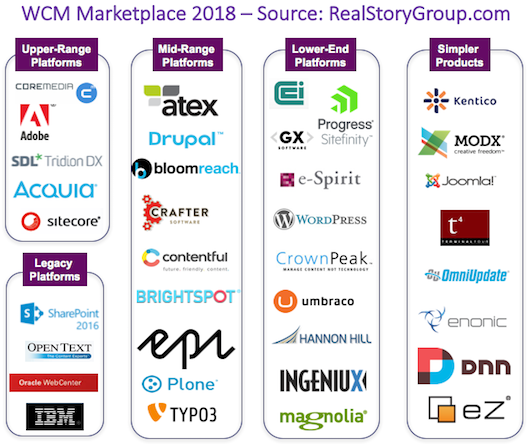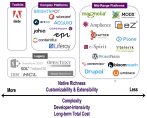Why Is WCM Such a Fragmented Marketplace?
At RSG we cover more than three-dozen Web Content & Experience Management (WCM) vendors, although around the world you can find hundreds more. Amid constant predictions of "industry consolidation" why do we see so many Web CMS vendors? I can think of at least six reasons.
1. Customer Needs Run the Gamut
When it comes to generating the right digital experiences, customer needs vary from quite simple to devilishly complicated. RSG's 2018 Web Content & Experience Management Logo Landscape shows how the major WCM vendors fall into five groupings across this complexity spectrum:
- Upper Range Platforms
- Legacy Platforms
- Mid-Range Platforms
- Lower-Tier Platforms
- Simpler Products

Different strokes for different folks. Vendors in the past that have tried to sell alternative WCM products for multiple tiers have failed, largely because there are too few synergies across the technology, sales, and delivery models.
2. No Roll-ups
One way that certain tech marketplaces can consolidate is via "roll-ups," where vendors acquire competing platforms create a kind of oligopoly. It almost never works. The technologies never blend together right, and the level of effort for a customer to switch platforms always proves so high that a smart enterprise just goes back to shopping on the street for a new vendor.
To be sure, sometime a tool gets bought and then put down (like when Episerver acquired Ektron), but that's still pretty rare.
3. Few Barriers to Entry
It's not hard to build the bare bones of a Web CMS tool. The enduring prevalence of consultingware and media companies trying to license their bespoke platforms shows that ambitions to crack this difficult market never abate.
Of course, building true software and a winning distribution model takes years, and few nascent start-ups graduate to the premier leagues in this space. Nevertheless, we continue to add two or three WCM vendors to RSG's report each year.
4. It's Not Game of Thrones
It's fun to speculate what this marketplace would like if it were Game of Thrones.
Some WCM offerings do die, but in the real world they're not killing each other with Westerosi abandon. Rather, aging WCM tools tend to linger on, growing sicker each year but rarely dying. See for example, TeamSite, or MS SharePoint.
5. The Biggest Vendors Have Failed
Speaking of OpenText and Microsoft, one of the most intriguing WCM story lines over the past decade has been the decline — almost exit — of the largest software vendors from this marketplace. I can sort of see why: WCM is technically demanding and not especially lucrative. As a practical matter, you the customer don't really lose out with the lack of a serious IBM or Oracle CMS play. If anything the vacuum they've left has created space for much more agile (if not always terribly mature) competitors.
6. Customer Lock-in
It's not easy to switch WCM platforms, and that keeps many systems plugging along. Many of the mid-range systems we cover are not growing dramatically, but they keep their customers happy enough. Barring a mad rush to the exits, the vendor can stay undead by recouping ever-beloved "maintenance and support" income streams.
Today, if your enterprise is looking for a new WCM vendor, you need to remain wary of a new approach to lock-in via vendor-managed cloud environments.
Your Choices
You have lots of WCM technology choices, and choice is good. There's always a temptation to short-cut your decision-making, but a smart enterprise will be intentional about the tools they select to support digital transformation.
At the end of the day, which WCM choices are best for you? You can find the right answers in RSG's hard-hitting evaluation research, or see how a decision-support tool like RealQuadrant can quickly get you the right short lists for your unique needs.









